Music Reviews
A LUNCHTIME PIANO RECITAL - John Thomson
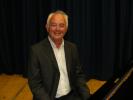
John was playing my favourite piano in Buxton in the United Reform Church, and he plays it really well and clearly loves it. Sadly although it is a fine sounding instrument, the action is a little slow and the venue is maybe a little small for such a big sound. Fast passage work is slightly hampered by the slow reaction of the instrument's mechanics. There is no doubting the sonorous nature of the tone especially in the middle and bass register and John used it to perfection.
He started with Beethoven Sonata Op 90 in E minor and then improvised his way into Brahms Op 80 which he clearly loves. This piano suites Brahms well and the richness of the sound was used to great effect. Some passage work got lost in the overall sound but the line was effective and warm.
3 Chopin pieces followed - the A major Polonaise, the C# minor Waltz, and the C# minor Impromptu. The Waltz was a little too fast for my liking and this acoustic, and the Impromptu needed a little more "space" especially for the "wrong note" melodic entry. But these pieces were clearly played with much love and the line was faultless mostly.
Satie followed and whilst the pentatonic melody line was beautifully phrased I found the dynamic range too wide for this reflective music. John then improvised his way into the Debussy "Sunken Cathedral" which was the best performance of the recital in my opinion. The Rachmaninov Prelude in C# minor concluded the afternoon's music. Again I thought the speed of the middle section was a little too fast for the piano and the acoustic, but it was so Russian I could almost see the composer glowering with pleasure! As an encore John played the B minor Prelude from Book 2 which was allegedly Rachmaninov's favourite.
John is a highly intelligent and intellectual performer and his spoken introductions were informative and helpful. Thank you John and well done!
Andrew Hodkinson
A MUSICAL COCKTAIL - Ladybrook Singers with guests Flute Salad
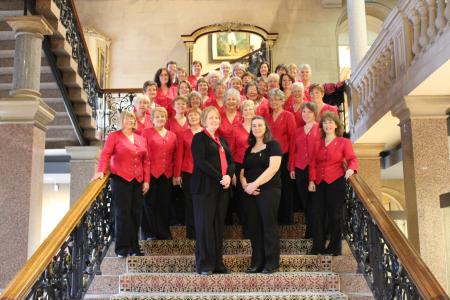
Ladybrook Singers made a welcome return to Buxton Festival Fringe at the Methodist Church on Saturday night with 'A Musical Cocktail'. An appropriate title if you take my dictionary definition of cocktail 'any combination of diverse elements'. As with any cocktail cabinet you have stock ingredients so you do with a concert. Here we had an experienced choir with a guest instrumental ensemble with the added dash of a solo performance.
Of course you need good quality ingredients for any recipe and tonight's performers certainly met the mark.
The concert started with a setting by Ladybrook's Musical Director, Alison Bletcher of 'Everyone Sang' by First World War poet, Siegfried Sassoon. The fanfare like interpretation was very fitting for the context of the words and an excellent choice to open a concert with singing at its heart.
Ladybrook Singers first group showed their dedication to text, continuing with pieces sung in their original language. There was a particular warmth of tone in Schubert's 'Du bist die Ruh' contrasting with the brightness of the Italian vowel sounds in 'Nella Fantasia'.
Special mention must also be made of Robert Latham's arrangement of 'Soldier, Soldier' showing how well the choir rehearses challenging pieces for adjudication in competition. Other numbers offered opportunities for choir members to sing solo phrases, competently met by Elaine Astley, Annette Crowe, Diane Martyn and Karen Bailey.
'Flute Salad' is a talented group of talented young musicians who are pupils from The Music Studio in New Mills directed by the Principle, Carolyn Hawkins. They performed twice in the evening and their choice of familiar melodies brought smiles of recognition from the audience, along with appreciation of versatile arrangements which included some with piano accompaniment and use of bass flute and piccolo.
Tom Galligan first appeared as flute soloist in a choral arrangement and later we were given another opportunity to hear his beautiful flowing tone in 'Hypnosis' by player composer Ian Clarke. As Tom introduced this we were made aware that instrumentalists recognise the perception of a composer who plays the instrument.
Alison demonstrated her skill as a choral director by holding the attention of the choir throughout the evening and giving gestures to encourage the singers to use appropriate singing techniques. She showed how she is immersed in the upper voice choral tradition with her choice of repertoire and accomplished arrangements. We also had insight to her talent as an instrumentalist by playing the delightful 'Fish and Chips' from Alan Bullard's 'Recipes' on recorder.
This was a concert that had the true flavour of Buxton Festival Fringe - a return visit from an experienced group enjoying the Festival atmosphere in the company of up and coming performers, both using the opportunity to showcase their versatility in new and established material.
Carol Bowns
A TOUCH OF THE DUTCH - Elrieke & Poldy
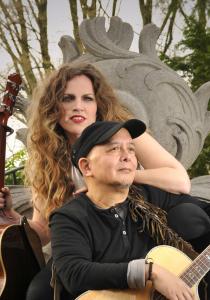
A Touch of the Dutch - pleased the reviewer very much!
This was a very enjoyable gig. Elrieke and Poldy treated us to a polished and relaxed selection of songs - some original and some covers. Both made full use of their talents as guitarist and singers treating us to a mixture of combinations - both singing, harmonising and playing - even some unaccompanied singing. Further variety with each singing a solo song and some with Poldy accompanying Elrieke, giving her the opportunity to focus attention her individual singing style. The haunting quality of her voice was heard with particular poignancy in the song 'Morgan in his case'. As Elrieke eloquently told the audience she wrote this song at a turning point in her life as music became the focus and she had to move on from a broken relationship and other commitments, signified by Morgan (her guitar) in his case.
The rapport Elrieke created with the audience was part of the attraction of this event. As a returner to the Fringe telling us stories relating to people in the audience, including Tony Boden, known to many as compere of Club Accoustic, her obvious affection for Buxton could only endear her to those of us who live here and show visitors how welcoming Buxtonians are.
With three more performances Wednesday 17, Thursday 18 at 7pm and Saturday 20 at 5:30 pm I can heartily recommend you go to along - maybe more than once as Elrieke promises the set list will change.
Carol Bowns
ACAPPELLA AND CAKE - Ordsall Acappella Singers
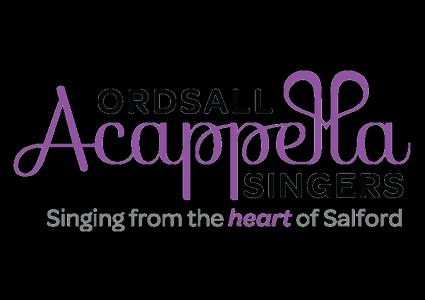
On a blisteringly hot carnival day it was lovely to stroll into the shade of St Mary's. It's an unusual and pleasing church, with brilliant acoustics. Beneath the carved angels, the Ordsall Acappella group assembled for what's become their annual outing to Buxton Fringe.
The 33 members (there are around 50 in total but they don't all do the same gigs at the same time) obviously thoroughly enjoy singing together and are led by the energetic Jeff Borradaile. Jeff also directs three other community choirs around the North West, and has nurtured some of the singers from school upwards.
The group, who formed in 2005, cover a lot of musical ground - from gospel (Joshua) to Under the Boardwalk.
Although the singers performed crisply and professionally, some of the songs didn't always retain the panache and character of the originals (John Lennon and Louis Armstrong are hard acts to follow in that respect). Their renditions of Imagine and It's a Wonderful World didn't hit the mark for me, as I felt the choral treatment and arrangements just didn't do these landmark (solo) songs justice.
Having said that, there were other songs the group performed that chimed perfectly with their style and the timbres of their voices. 'Wasma, Wasma' (a traditional Ghanaian song) worked very well as did the jaunty 1930's tune 'Love is the Sweetest Thing'. I loved the Randy Newman song 'I Think It's Going To Rain Today' too. The really spine-tingling moment was when the group sang 'Deep River' - a soaring spiritual. I would have gone to hear them just for that one piece alone.
They also make good cakes (along with the folks from the church, who were very welcoming).
There was some distracting background noise - rattling tinfoil and a child playing with some clacking bricks. The brilliant acoustics did not discriminate!
It was really nice to mix and mingle with the friendly group after the performance for tea and cake. They were all great ambassadors for singing, and keen to encourage others to have a go themselves.
I'm sure the 40 strong audience would agree that Ordsall Acappella do sing from the heart and - given the right song - can make your heart sing too.
Heidi Chiang
ACROSS THE POND - North Cheshire Wind Orchestra
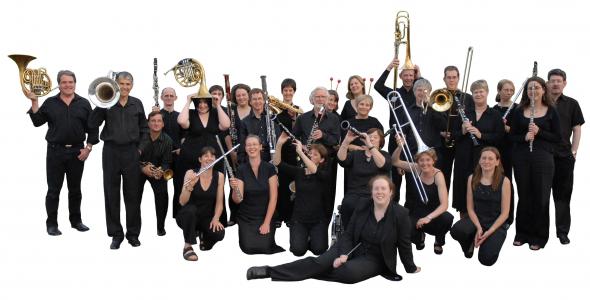
(This concert started one hour before the time given in the Fringe programme. As a result your reviewer missed most of their programme and only heard two pieces that are reviewed below).
This is a large wind ensemble augmented by a percussion section. It is entirely suited to the modern style of Copland' s Variations on a Shaker Melody which they played with considerable gusto.
The concluding work was Nimrod from Elgar's Enigma Variations . Tempo is very important in this piece if it is not to sound like a funeral march. Nimrod was Elgar's great friend Jaeger who hunted Elgar back to work . The performance of it should convey the affectionate nature of their friendship rather than sorrow and in this the orchestra were largely successful.
PL
AMERICAN BLUEGRASS MUSIC - Aprille and the Shower
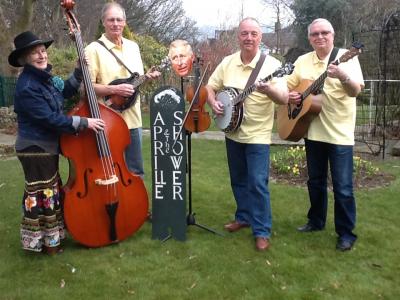
Most people, on entering a chain pizza restaurant, would not expect to be confronted by a bluegrass band, but that is exactly what did happen at Pizza Express on the first night of the fringe. To further add to the confusion, Aprille and the Shower do not hail from anywhere near the Appalachian Mountains, rather they reside in South Yorkshire and Derbyshire.
While their physical home may be on our own doorstep, there is no denying that their spiritual home is Kentucky, Tennessee, Carolina, Virginia, anywhere where musicians, steeped in tradition and overflowing with talent, gather around a microphone and sing songs of love, loss and whatever else takes their fancy.
It is fair to say that when the band struck up, it took most diners by surprise and for a short while it seemed that only the staff were appreciative of the music, but gradually it weaved its spell and by the end of the first set feet were tapping and hands were clapping.
Tonight Aprille and the Shower were a 4-piece: Aprille Deacon, double bass; John Leary, banjo & vocals; Clive Ballentyne, guitar & vocals; Steve Read, mandolin & vocals. The intricate interplay of the various instruments - guitar, banjo, mandolin, all kept in check by the redoubtable double bass playing of Aprille herself - provided an ideal aural backdrop to the close harmony singing. It was lovely to see the band grouped around a single microphone, as is traditional in this type of music, meaning not only are the harmonies very close indeed, but also some nifty footwork is required to sidestep each other when soloing.
The instrumentals, Pony Express, Blue Ridge Mountain Blues, and (described as the national anthem of bluegrass music) Foggy Mountain Breakdown all admirably showcased the band's instrumental prowess. Delicacy and deftness in picking styles are backed up by the power and woody thump of the upright double bass. Known as 'breakdowns', these instrumentals are best described as a kind of twangly free-for-all with solos. They are infectious, dexterous and thoroughly enjoyable.
Musical dexterity is one thing, but when it accompanies harmony singing this good, you know you're in safe hands. Perhaps the most well-known song of the evening, made famous by the film O Brother Where Art Thou?, was Man of Constant Sorrow. Many from the bluegrass canon preceded it - Kentucky Girl, Walking After Midnight, the witty and appropriately food-centred Left-Over Biscuits, and, a cracking version of Just Because.
In an age dominated by over-produced, auto-tuned, ersatz karaoke warbling, it is worth travelling back in time to when music was simultaneously simpler, yet more complex, and certainly more heartfelt. Aprille and the Shower may be just the band to transport you there. When next they play the fringe (10th, 17th July) they are joined by fiddle player, Bob Dehl.
Mark Twain famously described a gentleman as "...someone who knows how to play the banjo and doesn't." I feel the gentlemen and lady of Aprille and the Shower might just have swayed his opinion.
Malcolm Lomax
AN EVENING OF COMIC SONG - Crimes Against Taste
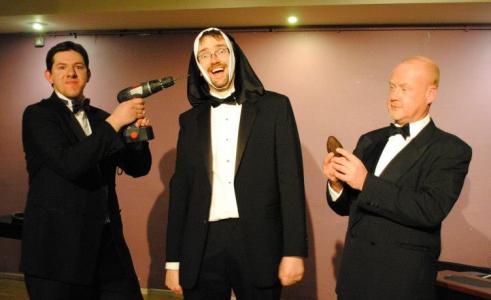
Crimes Against Taste - the clue is in the name
This was a very clever show. Three guys - all with exemplary credentials as classical musicians - showed us that a lewd sense of humour can lurk beneath the proper exterior. Baritones Pete and Jon with pianist Robert in conversation together, took us on a journey of adult themed humour under the pretence of relating their life histories. It may sound contrived (which it was) yet it worked as their tongue-in-cheek repartee was part of the game. It was also a way of taking us through a history of comic song from great exponents such as Flanders and Swann, Tom Lehrer, Jake Thackray and Monty Python to contemporary performers Flight of the Conchords and included some dodgy alternative lyrics to familiar songs.
Their rendition of Victoria Wood's classic 'Let's do it' is proof that a good song can be interpreted in different ways without detracting from the original. In fact the same could be said of all the songs in the show which were heard with fresh ears as they were put in a different context.
The performance was slick and well paced and of a quality that immediately puts the audience at their ease - murmurs of approval heard from the outset and some extremely positive audience feedback at the end. It seemed as though a few songs were tagged on at the end after what could have been the finishing number. The excuse could be made that there is so much material out there that they wanted to include - well, perhaps you should write another show!
As we are warned in their publicity ("probably not much ruder than something you might hear on Radio 4") and clearly communicated by their name, subject matter is not necessarily politically correct but Kenny Everett would have said it was in the best, possible taste!
Carol Bowns
AN EVENING OF CONTEMPORARY ORIGINAL SONGS - Reg Meuross, Henry Priestman & Jess Vincent
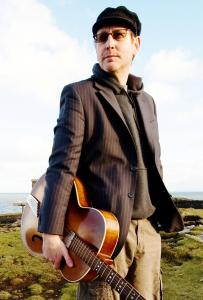
The notion of singer-songwriter took a bit of a hammering sometime last century because it seemed that everyone thought that they could do it and we saw and heard an endless stream of people of limited talent who had little to say. Now this is a great pity because in terms of music and the human condition the songwriter should occupy the most important place. How lucky Buxton was, therefore, to be able to hear three very different but excellent singer-songwriters in one room.
In the first half of a very generous two-and-a-half hour show Jess, Reg and Henry sang original songs on their own (save for Henry's last song which anticipated the format of the second half). After the break there was something of a song-swap where one took the lead and the others would accompany vocally or instrumentally. But this is mere description!
Henry Priestman may be best-known of the three. Last century, again, he was part of The Christians and the song of theirs that is most remembered is 'Ideal World'. The song in some way represents what Henry does best and disarmingly. It is a friendly accessible song - and yes we all joined-in on the choruses - but at heart it is a reminder that what we hope and aspire for, and what we get and may settle for, are different things. 'In My Head' was a song which also explains "how useless I am" said Henry. He also had a brace of songs about loss, grieving and recovery which showed another side to him. 'So Far From Home' was written around the time of the deaths of his mother and mother-in-law. 'The True Believer' reflected that, yes, time heals.
Jess Vincent was the youngest of the three - her second album is to be released shortly. Maybe because she has had fewer disappointments or hurtful experiences in life her songs and her voice carry a freshness and hopefulness. Her songs were less directly autobiographical - she had a song about a female pirate, Anne Bonny, whose lover failed to fight like a man and who died like a dog. She also led the only cover song of the night 'God May Forgive You, But I Won't' - which she took from the singing of Iris Dement.
Reg Meuross is a softly spoken man but he plays a banjo, guitar, mandolin and ukulele with precision and passion; he has also written a whole clutch of songs that deserve to more widely known and sung. 'Lizzie Loved A Highwayman' was the 'true story' of Dick Turpin; 'My Name Is London Town' describes something of what the city sees and experiences; a brand new song 'England Green and England Grey' expressed the love and anxiety that many of us may feel for the country. Reg has a talent for the memorable and telling phrase: "That was all she said/all she wrote/And she put on a goodbye hat/And a goodbye coat."
Reg it was who led the final song - based on an experience in Doncaster - 'Phil Ochs and Elvis Eating Lunch In Morrisons.' The evening as a whole was filled with warmth and enjoyment. Thanks to everyone.
Keith Savage
AN EVENING WITH AFRICA'S LADY OF SONG - Margaret Ferguson accompanied by Jonathan Ellis
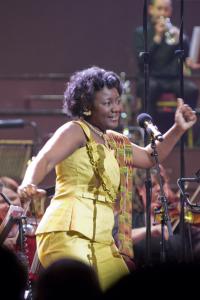
It was good to welcome Margaret Ferguson back to the Fringe again and to be reminded what a fine voice she has.
This year her programme was divided into two distinct parts. The first part was largely focussed on classical opera whereas the second comprised mainly of songs from musicals and operettas. Margaret has no difficulty coping with the demands of such widely different music.
She opened with a stunning excerpt from Artaxerxes by Thomas Arne with very impressive bel canto. This was followed by two French songs, Verdi's Merce, di lette amiche and then a lovely performance of the beautiful Porgi amor from the Marriage of Figaro. The first part concluded with a rousing excerpt from Oberon by Weber,
After the interval Margaret sang songs by a wide variety of composers including Novello, Sondheim and what sounded to me like Borodin but was attributed in the programme to Wright/Forrest. She concluded triumphantly with two well known Gilbert and Sullivan songs Love is a Plaintive Song form Patience and the highly spectacular Poor Wand'ring One from the Pirates.
Margaret is fortunate in having the brilliant Jonathan Ellis as her accompanist. The have worked together now for many years and their rapport is solidly founded. Together they gave us a memorable recital. I hope they will return to Buxton for next year's Fringe.
Peter Low
AND OTHER TALES - Rebecca De Winter
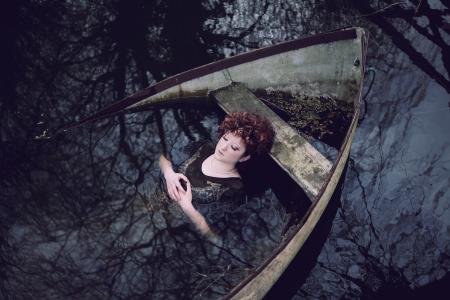
Returning to the Fringe and with change of venue from last year Rebecca de Winter again showcased her talents.
Accompanied by the able Dan on percussion and her sister Natalie on violin and the addition of Dave on guitar saw Ms de Winter's troupe number rise to four. We were once more treated to an evening of mostly self-penned songs, beautifully played and sung. Themes of love and loss naturally appeared as they are the stock of most songs we know, but there was also hope and humour. There were two new songs toward the end of the show, and Ms de Winter was unsure as to their placement. Perhaps separating them might have worked, but they seemed to blend in with the rest of the set relatively seamlessly.
All of the musicians were faultless in their playing, even if Dave had to de-tune on occasion. Ms Winter's style might best be described as 'upbeat melancholy' and as such she had to assure us that there were happier songs. I might have expected more than two new songs in a set that was largely the same as last year's, but the audience enjoyed the show and went home happy. Job done really.
You can catch Ms De Winter on Youtube and Twitter if you want to hear/learn more.
Ian Parker Heath
BAROQUE FESTIVAL - James Pelham
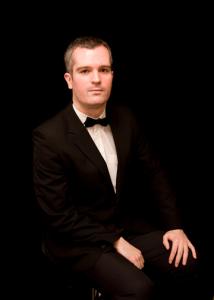
For lovers of baroque music this was just the thing. A programme of works by Bach, Couperin, Scarlatti (Domenico), Handel, Telemann and Rameau, some well known and others less popular.
James obviously loves this music and he played with evident enjoyment which was communicated to an audience which almost filled the United Reformed Church hall. Most of the pieces were quite short and presented no difficulties in appreciation. I particularly liked the way he played Scarlatti's sonata in D minor. Although this is a really well known composition James gave it a freshness that was delightful.
James had saved the best until last, Bach's Italian Concerto. Again this is another very well known work but James gave it a quality of gravitas that was most attractive.
The United Reformed piano is a large Broadwood that once upon a time had been rather good. But I wondered if it was the right instrument to capture the subtleties of baroque music.
Peter Low
CLASSICAL MUSIC THROUGH THE AGES - Sara Whichelow and Tim Kennedy
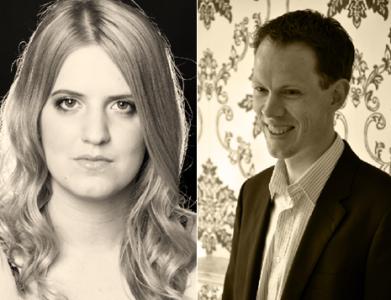
What a wonderful summer this is! Not only beautiful weather but, as well, some great recitals on the Fringe. This was yet another. Sara Whichelow ( soprano) accompanied by Tim Kennedy, well known in Buxton for accompanying at the Spring Buxton Musical Festival. The title of the programme was very appropriate for a variety of works from Bach through Donizetti and Debussy to Holst and Britten.
Sara began with the Queen of the Night's aria from Act 2 of The Magic Flute This was incredibly brave as it is one of the more challenging pieces for s soprano. But she has a powerful voice and was completely secure, so much so that her singing seemed almost effortless. She followed the Mozart with the contemplative Magnificat by Bach and then an aria from Donizetti's Anna Bolena showing us her utterly confident bel canto.
We then had Britten's setting of Auden's Funeral Blues, a poem that shot to fame when it was recited in the film Four Weddings and a Funeral. Britten's composition is rather austere with an insistent beat like a funeral drum. Fauré followed and then two songs by Holst, Weep no More and Lovely Kind and Kindly Loving both of which I was really pleased to hear as they were new to me and demonstrated yet again how often one encounters new musical experiences on the Fringe.
We were then into solid impressionism with Debussy's setting of Verlaine's poem Pantomime, followed by his setting of Pierrot by de Blanville which sounded distinctly like a variation on the French nursery rhyme Au Claire de la Lune. Then three songs by Mahler from the collection of folk songs called The Boy's Magic Horn, the first somewhat dreamy, the second a dance and the third a joke.
The recital concluded with Armstrong Gibbs' Why do I Love? and finally an exciting modern work by Jeanine Tesori called Girl in 14G which combined classical, music theatre and jazz all of which Sara handled with aplomb.
There were excellent, and much appreciated, programme notes with translations of the foreign language works to add to our enjoyment.
Peter Low
CLUB ACOUSTIC - Local Singers and Musicians
Club Acoustic is part of the regular, that is not just Fringe, music scene here in Buxton and the surrounding area. It gives locals and visitors a chance to hear what's happening here and catch a good evening of music.
As befits such a venture an open-mic programme is always guaranteed to bring a mixed bag of performers, songs and styles and last night was no exception. There is always a mixture of originals and covers at Club Acoustic and of the former, I did like Bin 53's 'Ass in gear' which had many feet a-tappin'. It's not just songs either, as Rob Stevens gave us a verse or two of poetry just to mix things up!
By the time Doug Torr was up singing James Taylor's 'You've got a friend' the room was singing along. Club Acoustic means you never have to be afraid of joining in! Indeed, it is expected. They say you can expect a warm welcome, and that's what you get. If you fancy popping along for some off-fringe tunes the next scheduled Club Acoustic is on the 17th July. Just cram it into the hectic mix that is the Fringe here in Buxton.
Ian Parker Heath.
DERBYSHIRE CCIYO SUMMER CONCERT - Derbyshire Intermediate Youth Orchestra
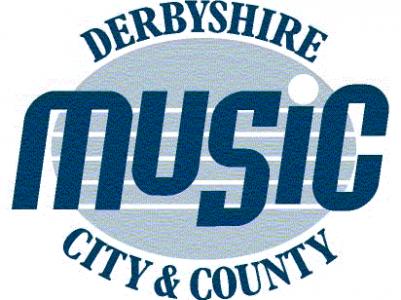
On the face of it to do a concert combining a youth orchestra and a professional ensemble could be rife with problems, but in fact it made for a thoroughly enjoyable evening's music. The concert began with the DCCIYO (what a mouth full), conductor Simon Bowler, playing the Prelude from Charpentier's Te Deum - a really good starter. I did miss the 'trills' in the main theme, but the sound was together, in tune, and with a good sense of rhythm. A little more attack would have been welcome, but in the acoustic of the Octagon Hall it is a big ask!
Sinfonia Viva followed, and performed 4 short contrasting pieces by Purcell, Bartok, Britten, and Stravinsky, showing a great use of instrumental colour - I particularly liked the Marimba or Xylophone in the Bartok Romanian Dances. The ensemble wobbled a little in a couple of places, but the Devil's Dance from Stravinsky's Soldiers Tale was spectacular.
There followed an experimental work using a combination of "composition" and improvisation which had been developed during the last 4 days with the Intermediate Youth Orchestra and Viva, partly forged, and held together with great skill, by Animateur, James Redwood. It was an impressive and organic sound-scape which built to a fortissimo climax showing great use of the various sections of the orchestra. I wanted to see the film that I felt should have accompanied this music - it would have been really gripping. Maybe in the future there is scope for a combined-arts course along these lines.
Malcolm Arnold's quirky arrangement of Tango by Albeniz brought the 1st half to an end in this concert of "Dance" music.
The 1st movement of Borodin's A minor Symphony got the 2nd half off to a wonderful start not only showing off the orchestra but also demonstrating Simon Bowler's clear control of the players. Three more items followed from Sinfonia Viva, and I have to mention the absolutely stunning arrangement of the 2nd movt of the Ravel 2nd String Quartet for all Viva's forces - it was so good I won't find the quartet version nearly so interesting in future.
The final item was the "Land of the Mountain & the Flood" by Hamish McCunn. This is, sadly, the only well-known work by this Scottish composer, even though he went on to write much more music including operas and orchestral works. This tone poem was written in his late teens for an examination and Hubert Parry (who marked it) was very taken with the work and it's composer. It is a very tricky piece and has some very demanding writing for most sections and most of it in a key that makes brave, hard bitten professionals quake, but it was brilliantly performed by these wonderful young musicians - Well Done! I am looking forward to the Senior players tomorrow night.
Andrew Hodkinson
DERBYSHIRE CCYO SUMMER CONCERT - Derbyshire City & County Youth Orchestra
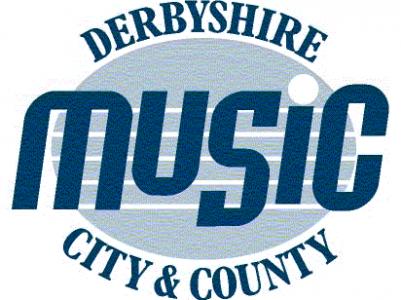
The lady behind me summed up the whole concert as the last note finished with the exited phrase "That was just fabulous!" She may have been referring to the last work in the programme but I really mean the entire concert.
What Peter Stark manages to produce from these youngsters is nothing short of spectacular - to do it in 5 days is a miracle! Peter has that wonderful combination of crystal clear direction, wonderful musicianship, and the ability to convey to the players a feeling of total confidence.
The opening work was the Britten - Sinfonia da Requiem. The very beginning of which is loud and in your face - and boy can these players do "in your face"? Britten was barely 27 years old when he wrote this extended symphonic work but his understanding of the orchestra was phenomenal and so also was the DCCYO. This piece is no stroll in the park technically and musically, and their depth and understanding of the music was not held back by lack of technique - quite the reverse, and they had the added benefit of stamina and youthful energy. The complex nature of the piece and the demands made on the players could be daunting but not tonight. The big moments were really big, but the ending was an achievement very few orchestras could bring off. If you sat with your eyes closed for a moment you were listening to a professional orchestra.
We then had the treat of Peter Maxwell Davies' "An Orkney Wedding, With Sunrise". I first played this only a couple of years after its composition and was quite "blown away" with it. I was again this evening - by the playing of DCCYO. They seemed to really relate to this piece - and the "inebriated climax" was extremely convincing - visually in one or two cases! The bagpipes just make this piece and the rather tall piper was a splendid site, and sound, entering from the back of the audience.
After the interval, we were treated to an amazing rendition of Rimsky-Korsakov's "Scheherazade". This is when all those solo players we had heard before, really had a chance to shine. Woodwind solos to die for, a horn, trombone and trumpet of real quality, and all set off by the strings and percussion with aplomb! The tone, rhythmic togetherness, intonation and ensemble all worked together to make this a memorable performance. Over all this, the guest Leader, Morven Bryce, wove a beautiful violin line of great warmth and phrasing. All held together by the indefatigable Peter Stark. His deft left hand gestures, and minimalist head-nod cues were a revelation, and I just wondered what might happen if he ever had a compelling urge to scratch his nose; would the entire orchestra explode with sound!
We, the listeners, and the City & County, have every reason to be very proud indeed of this group of young musicians.
Andrew Hodkinson
FLUTE RECITAL - Rachel Johnson and Jemima Palfreyman
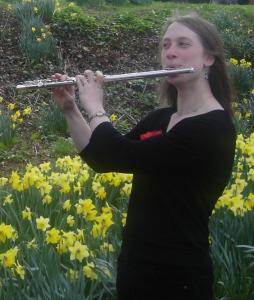
After having put 4 new tyres on my car (£££'s) I was in need of something uplifting and this was just what the doctor ordered. A delightful duo playing with such professionalism and style, and a clear love of the music they were performing. What a treat - a detailed programme and chat as well from both players. It is so refreshing to go to a concert/recital where one is only aware of the music and not the technical difficulties. This was communication on a musical level that is all too rare.
The first piece was completely new to me (and I suspect the whole audience). Edward German Suite for Flute and Piano, and as the programme note said, it deserves to be much more widely known - a little gem. Blavet followed (French Baroque) - the 5th Sonata from his Op 2, and it is quite beautiful, and was splendidly performed.
The following piece by Ian Clarke was an amazingly evocative work that really conjured up an "otherworldly" sphere of music but at the same time was so accessible and wonderful to listen too. Not short on technical demands but always played with style and panache. Taktakishvili followed in the guise of his Sonata for Flute and Piano. This is an amazing work with two busy and entertaining outer movements, enclosing an Aria with harmonic progressions to die for. A bit of a French influence here, and a deeply emotional movement. Wonderfully performed.
The last piece was the Carman Fantasie by Francois Borne and what a great little piece this is. I think I spotted 8 Bizet melodies but I may have missed one. The Seguidilla had variations of such complexity, but always well controlled and spirited. The Toreador had the last word and brought the recital to a perfect conclusion.
I do admire anyone who can tame the Yamaha Piano in the church especially with the lid fully open. The accompaniment was robust and sympathetic by turns, and Rachel's Flute playing was open and appealing to the listener. Both played with consummate musicianship - I didn't want the performance to stop. What an enjoyable hour this was.
Andrew Hodkinson
GOLDEN VOICES OF THE TOWNSHIP - Africa Entsha
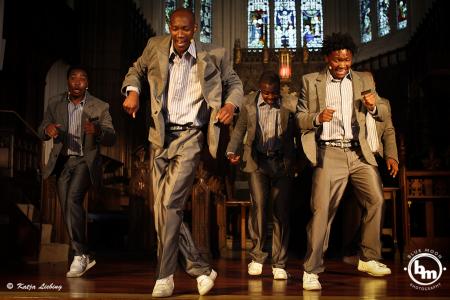
St John's Church is an imposing stage for any act to make their own, with its high reaching ceilings and distractingly magnificent stained glass windows presenting a distracting backdrop. Yet when the four young South African men of Entsha (translating to New Africa in Zulu) stood before their audience and began to sing Africa enveloped the audience and church with a pulsating surge of vibrant energy, with any fear of distraction quickly lost.
Entsha attack the senses with their pounding feet, fluid movements and impressive a cappella range. As much as you try, it is near impossible to peel away the layers of sound - a unique click or rich harmony - and trace it back to its original source, instead the thumping of feet, slapping of hands and fluctuating tones unite in an explosion of colour and life, a true celebration of South Africa and its diverse and vibrant society.
Entsha are storytellers, as they spin and jump across the stage they weave a tale of their past and present lives; tying hardship to hope, and hope to joy. The audience soon finds themselves on a journey that is deeply moving but also uplifting. Switching between traditional pieces, sung in the beautiful Zulu tongue, and contemporary songs in English, the group express the cultural fusion of their country. No matter the song, language or pace, Entsha's beautiful tonal range, watertight choreography, and their disarming smiles all come together to present a truly unique experience.
If the audience can give just half as much back as Entsha throw out then the evening will be an explosion of Africa and energy, leaving you smiling for hours afterwards.
Philippa Hurst
KERRY HUNTER & SAM PARTRIDGE: TRADITIONAL FIDDLE & FLUTE - Kerry Hunter & Sam Partridge
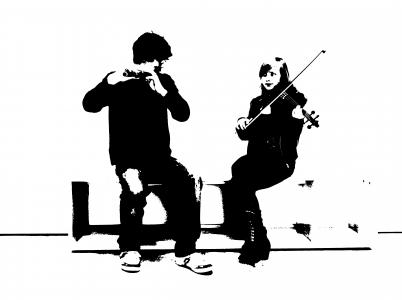
A completely enthralling performance from Kerry Hunter and Sam Partridge ranges through a huge variety of jigs, reels, slides from Britain and Ireland. They show an understanding of their music which they explain comes from their learning, they have both just completed the second year of their folk degree. They open with a horn piper reel, learnt from an accordion player in Ireland. Sam's flute led in with a haunting lilt, and Kerry's fiddle created a warm background, and after a few minutes the tempo increased to a lively pace as they tapped their feet and I saw two young people intense and passionate about their music.
They moved on to two slides, which Sam explained as a fast jig in 12/8 time, very traditional in the Cork area in Ireland; and then a jig from Selkirk where Kerry lives. The lively sound was maintained and Sam's acoustic guitar gave a strong earthy structure.
Kerry told us they had re-arranged Duncan Chisholm's Waltz of the grey River several times, since she got it from a fiddle player she knows, and the result was magnificent, opening with haunting flute and slow atmospheric fiddle, it was ethereal and evocative, and I could hear the grey river waltzing in its ebb and flow. They went on to a recent composition by Duncan Gordon, a piper from the Highlands, and then to a very traditional jig by fiddle player Colin Farrell, that everyone was beginning to tap their feet to.
They slowed the pace briefly, bringing in the acoustic guitar in place of the flute, then back to another jig called 'melting', from their year in Ireland, which with an obscure time signature, drew you in and immersed you, keeping you on the edge of your seat wanting to hear more. When you think you know where it is going, it changes its direction and brings you another surprise.
Two more jigs followed, ones Kerry got from a big family of traditional Irish musicians, one written by Paddy O Brien, another by an American fiddle player. Kerry explained how most of their songs were gathered from people like O Brien, by one or other of them, and brought to the other to try. By this time everyone was tapping their feet and showing how much they were enjoying this. Then some reels that Kerry thought may have been written by Paddy. She explained she had to get used to the way they play around with compositions in that part of Ireland.
The penultimate song 'totally modest' was inspired by a man on a bike winding through the lanes in the highlands. This started with Kerry picking the fiddle strings sounding like birds tweeting and Sam on the flute sounding like the wind blowing around the country lanes.
A Scottish march and two reels finish the set on a faster pace, leaving us on an exciting, lively note.
Don't miss them at the Underground Venues on 13 Jul 3:30pm to 4:30pm, 14 Jul 6:30pm to 7:30pm £6 (Child and Conc £5)
Jacqui Roote
KISS OF THE RED MENACE: A TRIBUTE TO KANDER & EBB - Kerry Jo Hodgkin & Ladyblue Music

Having been intrigued by the eye catching marketing for Melody's show during last years fringe, I was keen to witness the show this year. Being completely unfamiliar with the works of Kander and Ebb - other than the Rob Marshall screen production of Chicago - I was unsure what lay in store. What my companion and I experienced was a lively, informative and truly entertaining show.
Melody has great charisma, is busting with confidence and enthusiasm and delivers both the narrative and musical components to the show with passion.
There were unfortunately a few small issues with the venue and I do not feel that it showcases the show to its full potential. The clearly audible background music through the venue's PA system was also rather off putting during the quieter ballads.
My companion and I enjoyed the show however, it does sometimes feel as though Melody is trying a little too hard to win over the audience, adding elements which she feels "should" be part of the show rather than what plays to her strengths. Melody clearly loves what she does and has a true passion for the music which the audience cannot help but feel. Great choice for a relaxed evening.
Emma Hughes
LUNCHTIME CHAMBER MUSIC - Bright String Trio with Emma Tennant
It's always a bonus having a printed programme and then to have pleasant, informative introductions, given today by Mary Dainton('cello) was extra special. By the way, I do like the colourful music stands!
The first work, Quartet in E flat for Clarinet & Strings by Stamitz, was played with verve and skill by all concerned. Some really busy music here in the 1st movt Allegro, and I found the viola part particularly interesting. In spite of a touch of nerves the playing was fulsome and the balance and ensemble was fine. The 2nd movt was a more reflective piece, and again the musical interest was shared around the parts, and intonation was excellent. This movt was far too short especially for such a lovely piece.
The 3rd movt was a bright and happy piece with many duet moments between players - a perfect blend of sounds and just a joy to listen to.
Gordon Jacob came next - his Shakespeare Sketches. This was a new one on me and a total winner. It was written a year before I was born and has stood the test of time even better than I have! In spite of being in a retrospective style the composer is pushing the boundaries of harmonic structure and progressions quite bravely. Always melodic and always good listening, the adventurous writing was in capable hands. There was a particularly wonderful 'cello passage in the first movt. I thought I detected a slightly French influence in the 2nd movement, and a superb use of the viola (Mary Anderson) just towards the end. The 3rd movt, "Here a Dance of Clowns" was very lively - extremely athletic clowns I thought. Rhythmically together, and declamatory with excellent ensemble.
The Hummel Quartet was a revelation to me and I was totally blown away by the performance. E flat does not sit easily with string instruments but this accomplished group had no problem. The deep and rich sound of this key was stated firmly and warmly with a good range of dynamics and tone colours - well done. the 2nd movt, Musical Joke, was humour on a higher plane than is often the case in music. A very serious form of fun, with some wonderful silly moments to lighten the mood. All the time Hummel is pushing the boundaries of composition for this period of music and making great demands on the players - but clearly not a problem this lunchtime.
The third movement was very deep and poignant with a long plaintive line. When it comes for my turn to be popped into a box I wouldn't mind this being played at my funeral - I will be listening!
The Rondo final movt was rather a joke as well and gave the clarinet a real chance to shine. A very engaging work played by a very engaging ensemble. If you missed this then you missed a treat.
Andrew Hodkinson
MUSIC FESTIVAL - St Peter's Church
Much Festival activity is focussed around the Crescent and the centre of Buxton. It is easy to overlook the busy communities of Harpur Hill, Fairfield and Burbage that are vital to the everyday life of the town. So this week-long Festival at St Peter's is an especially welcome addition to the Fringe.
Fairfield parish - as its residents are quick to emphasise - is the oldest settled part of Buxton and St Peter's Church is a calm oasis off the A6 on the northern approach to the town.
Marion Wright and many others have been working hard on putting this full and varied programme together since the beginning of the year. Every day, music can be heard in the church and on the opening day the Fairfield Band was on hand to entertain, playing from the shade of a marquee. 'Mamma Mia' wafted through the air as I was leaving more than two hours after the start of the Festival. This weekend a range of classic cars are on display and the best-value cream teas in town are on offer. There is plenty of space to sit and observe in the church and the churchyard and to chat with whoever else happens to be passing through. You can be sure of a warm and friendly welcome.
This week the Church is also home to an exhibition of a dozen or so squarish canvasses painted by Mara Edwards. These mostly are set in the summer out-of-doors. Many have just one or two people - apparently contented and reflective. They are a happy addition to the Church interior. This Festival deserves every success and you are unlikely to regret a visit. The remaining concerts are:
7th July (7pm) Affinity Show Choir - close harmony singing and much more
8th July (7pm) Africa Entsha - a cappella singing and dancing from a Soweto quintet
9th July (7pm) Rev. Carl & Friends with special guests Plague 'o Bells
10th July (1.30pm) Choirs of Fairfield & Dove Holes Primary Schools
11th July (7pm) Jazznotes - swing band
12th July (7pm) Elvino & The Ragged Company - country rocka hoola
Keith Savage
MUSIC FOR STRINGS - Amaretti Chamber Orchestra
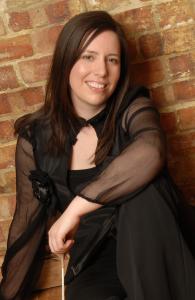
The Amaretti were formed in order to play music to a high standard. They certainly confirmed their founder's intentions with this concert.
They opened with a solid account of Bach's Third Brandenburg Concerto. This is really well known and so it relaxed the audience for the less well known works which were to follow.
Next they gave us a modern work by the Finnish composer Rautavaara called The Fiddlers. This was new to me and I suspect most of the audience, but really Nordic and redolent of the dark and cold winters in Finland.
The first part concluded with a delightful piece by the Irish composer O'Suilleabhain entitled Oilean for flute and strings with the conductor's sister, Nuala, playing the traditional Irish flute solo. It was again new work to me but I very much enjoyed its wistful Celtic character.
After the interval the audience were relaxed again with a well known work, Barber's Adagio for Strings . And then the main work in the programme, Shostakovitch's Chamber Symphony in C minor, Opus 110a. This work had started life in 1960 as a string quartet and subsequently been arranged for string orchestra by Rudolf Barshall. As the conductor explained Shostakovitch was worried that he would be forgotten so he had littered the score with a phrase made up from his own initials and with quotations from his other compositions. It was fun trying to identify them. This was a highly polished performance with fine solos from the leader and section principals. The audience loved it.
There were no programme notes but the conductor, Sinead Hayes, in her very engaging Irish style, gave us amusing and thoughtful explanations about the new works which were very much appreciated.
Peter Low.
MUSIC ON THE ROOF - Pump Room Roof
Jaynie Smee, Arkham Karvers.
In a nod to the Beatles atop the Apple building in 1969, Music on the Roof is Trevor Osborne's compensatory gesture for the disruption caused by the building project in the Crescent. On this evidence it is well worth the disruption.
The music began with Jaynie Smee, a local young singer-songwriter who has been singing all her life and accompanying herself on acoustic guitar for about a year. She is influenced by the likes of KT Tunstall, Aretha Franklin, Amy McDonald and Beyoncé.
Jaynie's crystal-clear voice stood out from the first number, Lucky. Her light, airy voice came across vividly and she appeared to grow as the set went on. For me the highlight was the moving A Road to Home which she rendered impeccably. She had presence and confidence which belied her comparative lack of experience. This is a very talented singer whose guitar work has come on amazingly in the past few months - you should take the chance to listen to her when you can.
Arkham Karvers were formed four years ago in Sheffield, although the line-up has changed since then. They consist of guitarists Greg Smith and Dave Gash, the latter the singer, keyboard player Mark Lane, with a rhythm section of Elliot Smith on bass and well-known local sticksman Josh Reddy. Their sound, somewhere between reggae and ska with liberal sprinklings of indie, owes something to The Police and, unwittingly, The Clash, although the band cite the more esoteric influences of Sheffield's own Milburn and Canadian reggae alt-rockers Bedouin Soundclash. Perhaps the best description is from the band themselves, who appropriately describe their sound as 'sunny music.'
Typically, the band's numbers started slowly, with funky bass lines from Elliot Smith and off-beat guitars from Greg Smith and Dave Gash, warming up with thundering drum rolls from Josh Reddy and rich-sounding keyboards, occasionally Calypso-style, from Mark Lane. The set was heavy on reggae/ska , with several numbers also targeting the indie audience. I particularly liked the treble sound of Greg Smith's lead guitar on a number of tracks, coupled to good effect with wah-wah pedals on Blind Eye. At times the percussive guitar riffs took on machine-gun like properties, and I loved the 'wall of guitars' effect at the end of several numbers, in particular Circles. This last track was a particular favourite, with its slow, sleepy start, building up to a fiery climax.
Most of the tracks were original, although mention must be made of two notable covers - Walking on the Moon began with a lilting bass line and featured innovative wah-wah pedal, courtesy of the Smith siblings, and Monkeyman was ska at its best.
When does reggae become ska, or vice-versa? This reviewer is unsure, but the off-beat guitar riffs and quickening tempo of the songs were catching and arresting. Personal highlights were Alaska with its warm keyboards and dynamic drumming, and the wonderful new song This Notion, with its groovy bass fills. The set came to a close with the tumultuous drums of Leeches, before the acoustic crowd-pleasing encore of Monopoly.
The odd sound glitch was the price you pay for outdoor music, but on a day like this, who in their right mind would complain? I would urge you to take any opportunity you have to take in this hard-working, energetic and talented band, who (fairly) frequently play locally. Meanwhile, Music on the Roof continues throughout the Fringe, featuring amongst others Rebecca de Winter, Africa Entsha, Nine Feet North and Burbage Brass Band. It's free, and, while I can't guarantee a repeat of today's weather, the music will be great!
And yes, Elliot, I did spot the Clash tribute-band number. Easy.
Ian Hamilton
Setlists.
Jaynie Smee: Lucky,You belong with me,A road to home
Arkham Karvers: Ribbons, Ticket to the Pictures, The Road, Walking on the Moon, The Prices They Pay, Alaska (Arthur), Blind Eye, Money, Heisenberg, Monkeyman, Circles, This Notion, Ocean, Leeches, Monopoly
MUSIC WITH FUZZY FELT WORLD - Fuzzy Felt World
The description in the Fringe programme said "Expect lashings of Beatles songs plus Hendrix and classic rock 'n' roll" Well that's exactly what we got and plenty of noise too!
The band played a large selection of tunes from mainly the 60's and 70's -material I'm very familiar with. Aside from producing standard covers of 'classics' they also included several extended re-workings of old favourites. While not all of them hit the mark, it was good to see them taking a chance and have a go.
Fuzzy Felt World are a local band and number among them Nick Tansley, aka Badger, who is something of a legend in local music circles and Matt Hilton who seems to be popular with the ladies. At one point 80% of the audience were women! If they have a weak spot it is the vocal duties - I think a much stronger singer is required to carry the material they do at the volume they deliver it at.
If audience reaction is anything to go by then the music, fun and dancing promised in the programme was delivered. Unlike some of the shows I've been to this Fringe, this one ran over time as people were having such a good time. Satisfaction guaranteed and delivered!'
Ian Parker Heath
ON WINGS OF SONG - Tim Kennedy
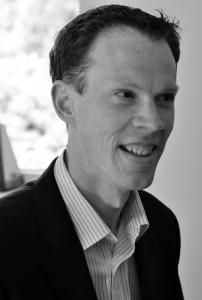
It has already been noted that one of the delights on the Fringe is that one can come across music that is rarely heard. Tim Kennedy's programme included ,amongst some well known pieces, a few that are much less well known and some which were probably having their first performance in Britain. The theme linking all these diverse works was love.
Tim has a very fine lyric tenor voice which is perfectly tuned and eminently suited to his varied repertoire. It sounded great in the more well-known music such as Schumann's Widmung, in the eponymous title of the programme by Mendelssohn and in Verborgenheit by Wolf. But it also suited the less well known works in Tim's programme including Love went a-riding by Frank Bridge and the Tewkesbury Road by the little known Muriel Herbert.
Amongst his many talents Tim can count languages . After two songs in Italian, and two more in French including the delightful Ici -bas by Fauré Tim sang three songs from the Philippines. Tim's programme notes had thoughtfully included translations into English of the foreign language works all which he sang in the original language. While this was very helpful with the German, Italian and French songs it was essential for the three Philippino songs, reputedly one of the world's most difficult languages, with which Tim concluded his recital. It was really interesting to hear these songs. I had expected more oriental harmonies but they sounded unexpectedly European.
Tim was fortunate to be accompanied by the highly experienced John Gough who additionally gave us two piano solos, Liszt's Sonetto 123 del petrarca and the haunting Amberly Wild Brooks by John Ireland.
Altogether a lovely recital for a warm summer evening.
Peter Low
OPERA CABARET WITH SUPPER AT ST MARY'S - Opera d'Amici
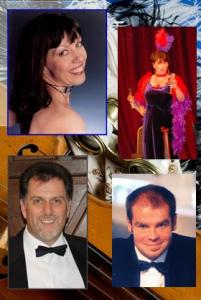
An incredibly brave idea of Opera d'Amici : a programme of Opera pops with a long interval for supper outside. In most summers the usual cold and wet Buxton weather would have put paid to that. But this year the company enjoyed the rare experience of a lovely warm evening with the added bonus of no local midges!
So we were treated to some very fine singing from Martin Rendle (tenor), Hannah Kirk (soprano) and Kathryn Hannah ( mezzo) standing in at short notice for Alison Charlton- West, all accompanied by Wyn Hyland who managed miraculously well with the somewhat dubious piano at St Mary's. The pieces they sang were all very popular and well known but were ideal for a Summer evening on the Fringe. I particularly liked the Barcarole from the Tales of Hoffman beautifully sung by the soprano and mezzo and the Mozart duet from Don Giovanni La ci darem la mano ,with appropriate acting of the Don's seduction of Zerlina, from the tenor and mezzo. The audience were even invited to join in the chorus of Funiculi, Funicula and to imagine ourselves on a funicular ,which we did with gusto. It was a great preparation for our supper on the lawn outside the church of salad and a glass of fizz sending us back in good shape for a selection of old favourites by Lehar , Strauss and Gilbert and Sullivan.
Altogether a most successful event made even better by the good weather.
Peter Low
ORCHESTRA CONCERT - High Peak Orchestra
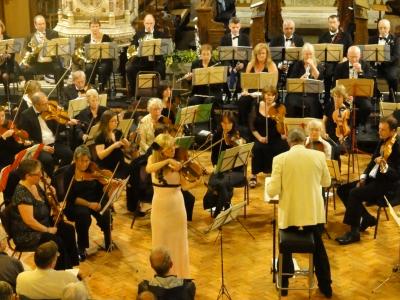
It says a lot about the abilities of the High Peak Orchestra that they keep attracting such wonderful soloists to join them, This year young Arryn Muston was the soloist in Sibelius' violin concerto. She was outstanding! It is not often that such a difficult work is played with such astonishing confidence. There was never a moment when she was not in absolute control. And the HPO with incisive conducting by Andrew Hodkinson gave her wonderful support.
The concert opened with Nielsen's Maskarade overture. This is a lively work which brought to mind the Danish ability to enjoy life. Then the well known Florida Suite by Delius was performed after the interval. The conductor explained that he had been waiting for a long time before he felt he could ask HPO to play this work. That they can do so now establishes how far the orchestra have developed musically. Indeed I have not heard them play better.
Due to the way in which the Fringe works HPO were not eligible this year for consideration for a Fringe award. But had they been I would definitely have nominated them for this very fine concert.
Peter Low
PARTITA: EARLY MUSIC CONCERTS - Partita
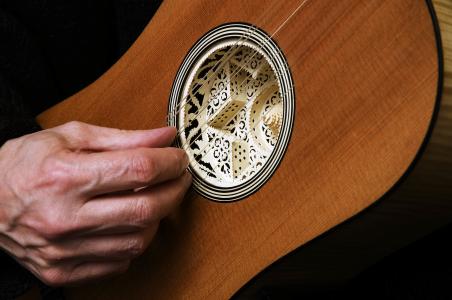
When I was a music student back in the 1960's I had to 'study' Early Music - and I didn't really like it very much. How different it might have been if I had experienced a group such as Partita. Their obvious love of the music and the musicianship and professionalism just transports the listener into another world. As before, today was no different. A true delight. This is for me the musical equivalent of a canal holiday - it is in a different time-scale from the hurly-burly of big romantic orchestral music. The pace and feeling is quieter, more spacious, more direct and intimate, but lacks none of the emotion or involvement for both performer and listener.
Today we were treated to just over an hour of Dowland in many of his moods. Not just sad and melancholy but a wide range of atmospheres. We started with Declamatory Dowland with 3 fine pieces that gave the audience a chance to 'tune-in' to the sound world. The communication with the listener, the faultless intonation and ensemble was a joy.
Reflective Dowland came next and the 2nd piece in the group, "Time stands still", was a high point - a duet between vocalist Sasha Johnson Manning and Roger Child on lute had beautifully shaped phrasing, and clear diction.
I could go on enthusing about the performances, but suffice to say there was not one low point in the whole recital. Melancholic Dowland gave us a new sound with 2 bass viols, and Doleful Dowland brought us the Theorbo adding another colour to the ensemble. This section also brought, for me, the most amazing song of the recital, "In darkness let me dwell". What a wealth of emotion there was here, with cadences and musical progressions to die for. So called Romantic music couldn't hold a candle to it.
All the performers in this group are wonderful and versatile; the delicious harp sound, the perfect timbre of Sasha's voice, the confident sympathetic playing of Roger, and the so very effective harpsichord playing throughout made for a really delightful lunch-time musical episode. Well done Partita.
Andrew Hodkinson
PIANO VARIETY EVENING - James Pelham
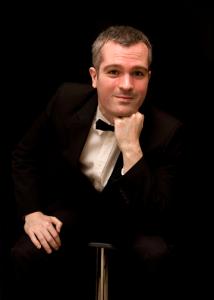
An interesting idea: a piano recital consisting of a variety of many short pieces of widely different styles from baroque through classical to romantic and modern so that members of the audience should find at least one piece that they like. In fact there was a linking theme in that all the composers were European although curiously none was included from Britain . So we started with Alessandro Scarlatti and progressed through Bach ,Telemann, Haydn and Mozart to Debussy, Grieg, Ravel, Mussorgsk,y and Kabalevsky, thereby covering most of Europe.
James is quite a tiger at the keyboard which he demonstrated with spirited accounts of the first movement of Beethoven's last piano Sonata, Opus 111, and Bartok's Allegro Barbaro. But his lovely performance of the much more subdued and achingly beautiful Moment Musical No 2 by Schubert showed that his technique is not confined to a fortissimo dynamic.
A very definite bonus was the quite detailed programme notes explaining a little about each piece and what musical details to look out for. This is particularly welcome with such a varied programme and also welcome in St John's where spoken explanations given by musicians at the front of the church are usually lost in the highly resonant acoustic of the nave.
There have been some rumours that the piano in St John's is not in very good shape. But James did not seem to have any trouble with it.
Peter Low
PROJECT ADORNO: 15 ELECTRO-POP VAUDEVILLE GREATS - Project Adorno

If you have been to the Fringe before, the chances are you have seen these chaps. Billed as a 'retrospective recital featuring 15 favourite moments plucked from 15 years of live performance' this show is in effect a 'best of' Fringe regulars Project Adorno. Their staple is quirky, eccentric tunes conveyed in an idiosyncratic style on a variety of instruments including the infamous Stylophone!
Last night's show was culled from several of their earlier efforts and on the whole it was an enjoyable escapade. Songs about and inspired by early computing (ZX Spectrum vs Commodore 64), London's missing rivers and office working were just some of the themes. My favourite was the one about Rene Magritte, but I'm a sucker for all things Magritte! The songs were as promised, electro-pop with a touch of whimsy. I'm sure you'll be able to spot their heroes in the pop world, but despite this many of the songs were undeniably Project Adorno.
If I have a criticism, it is that after all the years and shows, Russell still finds it hard to carry a tune or keep time. That, however, is perhaps part of their charm. Plucky amateurs who give it their best shot and aren't put off by the occasional spot of bad press.
The duo have been working together for a long time now, and it's fair to say they aren't likely to get that 15 mins of fame, but I think they can be famous for 15 people if you get along to their next show before we say goodbye to Underground Venues in its present arrangement.
Ian Parker Heath
REFLECTION: MUSIC FOR THE PERFECT FRIDAY EVENING - Cantibus Choral Ensemble
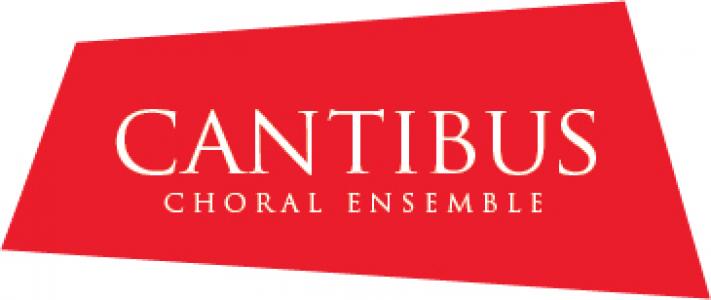
The acoustic of St John's Church in Buxton was ideal for the debut of this a cappella choir and their programme 'for a perfect Friday evening' of largely 19th Century songs. The 23 strong choral ensemble of experienced singers from across the North West of England are led by Yorkshire resident David Evans. These talented singers clearly love what they do with some of them performing in three or four different choirs each.
For this first ever public performance of the newly formed group they opened with Thomson's uplifting Alleluia and moved through a varied sample of their broad repertoire. The programme included pieces by Elgar, Bruckner, Tallis, Pearsall, Faure` and Mozart as well as a traditional Haitian piece and the pretty American Shenandoah.
The informal atmosphere set by Evans introductory chat was enhanced by the interval refreshments served by the dexterous singers themselves.
As one of the choristers, Nigel Spooner, is also a professional organist, and St Johns hosts an excellent William Hill organ, they couldn't resist digressing from the otherwise a cappella arrangements with an accompanied Mendelssohn (Verlieh uns Frieden), and the Saint Sans Organ Solo, Fantaisie in Eb.
This talented group who seemed equally comfortable singing in German, French, Italian and even Creole as well as English, are a welcome addition to the north and midlands touring circuit. They have come together partly because of their shared love of vocal harmonies, and partly to get involved in community and charitable work. This self funding group will soon be embraced by charities and community organisations looking for high quality, classy performers for their fund raising events. Cantibus can be contacted on info@cantibus.com or 07957 306860.
Jean Ball
SOLO VOICE RECITAL WITH PIANO - Jonathan Hall and Piotr Wisniewski
Jonathan sang at the 2011 Fringe and so it was a pleasure to welcome him back to Buxton. His programme was one of English song - if we allow Handel and a couple of Scottish poets - and he drew on some of the greatest writers we have; Purcell, Vaughan Williams, Shakespeare and Hardy. Some of the other writers represented may be 'minor' but are still significant - Eric Coates, Gerard Finzi, Ivor Gurney and John Masefield.
As you might expect Jonathan's bass-baritone filled the room and throughout he was sensitively supported and accompanied by Piotr Wisniewski on the church's Broadwood piano. [Piotr said that it wasn't the easiest instrument to play but he is evidently so skilled and experienced as to get the best from it. This was evident in his solo, Eric Coates' 'Westminster Meditation'].
Jonathan seemed most at home and assured with some of the more modern song choices; Hardy's 'Lizbie Browne' (set by Finzi) and Stevenson's 'The Vagabond' (set by Vaughan Williams) were especially enjoyable.
The audience received the singing and playing with enthusiasm; it is to be hoped that Jonathan and Piotr got as much pleasure as we did.
Keith Savage
SOMETHING OLD, SOMETHING NEW - Deconet String Quartet
This evenings programme performed by Deconet Quartet was varied and did indeed offer 'Something old, Something new'. For the old we were given Mozart, Bridge and Britten and for the new, Patrick Jones and Adrienne Spilsbury two local composers who were there in the audience.
I have never been to a classical concert before so was very pleased that each of the pieces was introduced and some information supplied about what we were about to hear. It was very much appreciated and entertaining.
The credentials of the ladies in the quartet are impressive. Their expertise and joy in playing is evident and they certainly make a beautiful sound together. We were also treated to a lesson about the 'Natural horn' by Jonathan Gibson who then joined the ladies for the Mozart 'Quintet for horn and strings'. I am by no means an expert but this did sound very complicated and wonderful. The tones blending in together beautifully.
Patrick Jones introduced his own composition which I enjoyed immensely and Adrienne Spilsbury also explained what her piece was trying to convey and I must say that it was a very pretty piece of music.
I would like to write in more technical terms about the sound, the nuances and the themes that the composers were trying to convey but we have already established that I am no expert. But I watched the audience as much as I watched the performers and they were all enjoying the evening and the prolonged applause at the end would indicate to me that those in the know were impressed. I think that the opportunity to talk with the composers during the interval and at the end of the concert was also very much appreciated.
As for me, I liked it a lot. So thank you Louise Latham, Nicola Bright, Mary Anderson and Mary Dainton for putting together a programme that anyone and everyone can enjoy. I thoroughly recommend a viewing and will watch out for them performing again.
Linda McAlinden
SONGS FROM THE AMERICAS - Local Vocals

This was a tremendously enjoyable event. Ten songs were sung led by Carol Bowns and assisted by Ian who played the guitar and had a general supportive role. It was not so much a performance but more a demonstration of what kind of activities the group does. For example, they start their sessions with a warm up which involves gentle physical activity and fun vocal exercises.
Carol Bown's enthusiasm was infectious and without realizing it the audience participated almost as if they were in the choir.
The 11 or so choir members sang with enthusiasm and showed what a fun activity singing can be. They often sang in 3 parts frequently swapping parts.
Several fun effects were used such as using the Mexican wave to depict thunder.
Ten contrasting songs from all over the American continent were sung. Bernstein and Gershwin were represented as well as lesser known Native American songs from Alaska. The famous folk song, Li'l Liza Jane and the blues song Chicka Hanka were given some imaginative part singing treatment.
I expect that many members of the audience would want to join the kaleidoscope lunchtime choir meeting on Tuesdays in the Pavilion Arts Centre starting on 17 September.
Roger Horvath
SOUNDS AND SONGS OF RENAISSANCE EUROPE - K'antu Ensemble
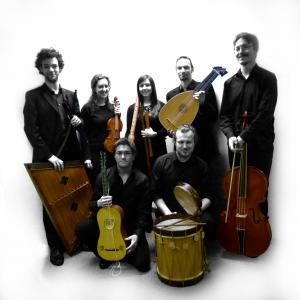
The talented young K'antu Ensemble brought a refreshing mix of world and early music to Buxton's Methodist Church on a sunny Saturday morning.
The six musicians performed twelve pieces using at least seven different instruments plus voices. The range of instruments included Baroque Guitar, Theorbo, Gamba, Crumhorn, Cornett, Recorders and Violins. They explained each piece in the colourful, light programme included three dances by Pierre Certon alongside Richard Dering's 'The City Cries' and 'Canarios' by Gaspar Sanz.
Accomplished, but fresh, K'antu are touring music festivals to promote their first CD titled 'Gusto' which includes all the tracks performed here including the delightful 'La, la, la, je ne l'ose dire'.
For more information go to www.kantu-ensemble.co.uk
Jean Ball
SOUTH AMERICAN AND EUROPEAN MUSICS - Emma Souza Lima
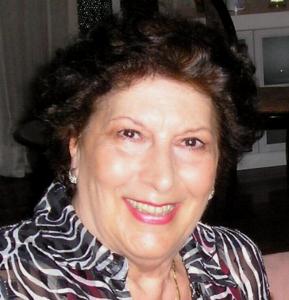
Now I'll have to admit to being a little disappointed by the balance of this programme. Of the 10 pieces listed 8 were from the European tradition - Bach, Scarlatti, Debussy, List, and Chopin. Just two pieces were by Brazilian composers - Villa Lobos and Clarisse Leite.
But no more complaining, there was much to enjoy in this 45-minute recital. Emma Souza Lima is an unfussy pianist. She isn't given to great flourishes of movement - she puts the music first and gives all her attention to the playing of it. She is a very experienced performer and in her professional life she also works on projects in Sao Paulo bringing music and music-making to disadvantaged children.
The recital showed that Emma is as comfortable playing Bach as playing Debussy and she moves from delicate single note phrases to huge clusters of chords with ease. It was especially pleasing to hear the two Brazilian waltzes. If Emma Souza Lima is in Buxton again I'd encourage her to share more of that music with us. Meanwhile the audience was clearly appreciative of the opportunity to welcome and hear such a fine pianist in Buxton.
Keith Savage
STRING QUARTET RECITAL - NCO Soloists
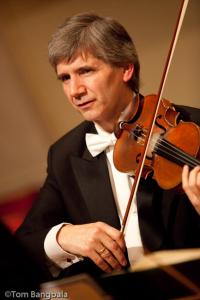
It was good to have an introduction to the players and the music by the 1st violinist, Nick Ward, and the link between the Festival Operas and this programme was neat. Not that the Mozart Quartet in E flat K428 from his "Haydn" Quartets needs much in the way of introduction - always a favourite, and as Nick says - a Masterpiece. The "sound" of these four players was warm and rich, and for me the quality of the viola is what can often make a quartet distinctive. We had quality in spades here. A sound like dark chocolate - if you get my drift!
All four players had technique in abundance, and the faultless intonation brought out the slightly daring harmonic sequences. Mozart worked very hard on these "Haydn" quartets to impress the "master" of the genre, but he wasn't averse to a little naughtiness in the way he composed, and his occasional "wrong" notes and strange (for the period) progressions need to be shown to the listener with a little more delight. Don't get me wrong, this was a brilliant performance with immaculate phrasing - I just needed a little more poison, a little more cheek! Likewise in the 2nd movt; whilst the players were enjoying the chromaticisms they needed to be more in our faces with it.
The 3rd movement was rhythmically exciting but maybe a little "safe". For me too the 4th movement was just a little close to being tame, but beautifully played with a charming sense of ensemble that is all too rare.
Then came the surprise work - Saint-Saens 1st String Quartet. Completely new to me, and I suspect many others. This is a tour de force for the players and they performed it with skill and verve. Saint-Saens was a strange man and a prodigious composer who made great demands on his players and this piece is right on the edge of romantic music and sometimes comes very close to more modern styles. This work is a big ask for any quartet, and this ensemble was more than able to cope, with some considerable style and flourish. The 2nd movement is a rhythmic nightmare, but not for these players.
For me the final movement was the greatest moment - what an amazing piece this is and the group came to life in this as not before. Well done - nothing like setting yourself a challenge and then bringing it off in style.
Andrew Hodkinson
SUMMER CONCERT - Manchester Recorder Orchestra
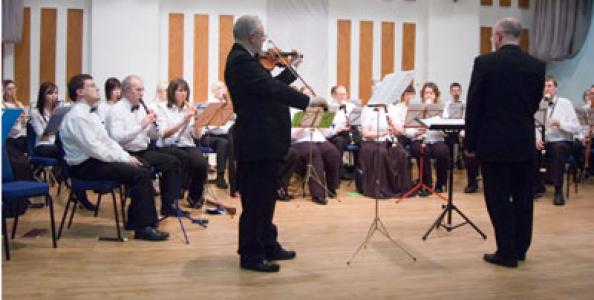
The Manchester Recorder Orchestra performed at the Buxton Methodist Church on Saturday 20th July .This was a very enjoyable experience for me and the rest of the audience. The orchestra had the whole range of recorders and showed a very high level of instrumental playing ability. I was most impressed by the clarity of playing in contrapuntal passages, their ability to make melodies sing out and their ability to work together was very evident in antiphonal passages.
The leader of the orchestra is Martin Bisknell who as well as getting the orchestra ready to start played numerous instruments throughout the concert. There were two conductors Ian Chester and David Walsh who showed a great deal of energy which brought the evening alive.
They played 4 works by Melville, Barnsley, Schofield and Schnabel. All of them modern but many of the pieces making reference to earlier music. In Melville's
composition he gives Tallis's Gloria tibi Trinitas his own treatment. In Parodies and Paraphrases on L' Homme Arme, Ian Schofield makes in effect a number of variations on this well known French Renaissance secular song. In the 'Whitby Suite' by Barnsley the orchestra showed how well it could create the impressionistic effects demanded by the composer. Whitby was placed right in front of us with its misty moors, hustle and bustle of the town's life, the mysterious monastery and the cries of seagulls.
A most interesting composition was Symphony No 1 in D minor by Dietrich Schnabel. In much of his career he has worked with recorder orchestras and at present he is resident conductor of 4 German recorder orchestras. This is the first time I have heard a symphony just for recorders. It lasts for 35 minutes and this is the first time this orchestra's 2nd half after the interval has consisted of just one work. The work was completed in 2007 and has affinities with the traditional Classical and Romantic symphony with the usual 4 movements.
A great evening and a new experience for everyone.
Roger Horvath
SUMMER SONG - Duodecimo
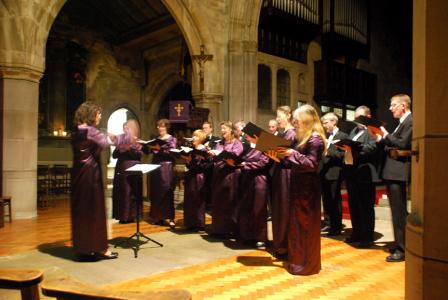
I've walked past St Mary's thousands of times over the last 20-odd years and have never been inside so I have to thank Manchester-based choir Duodecimo for this calming experience after a long day on Buxton Carnival.
Duodecimo is 16 strong (9 female voices and 7 male) and has a well-balanced sound that is quietly managed by musical director Richard McHale. The programme presented to us was apparently typical of the choir's repertoire; the first half was a mixture of sacred and secular 'early music' while in the second half the focus was on music composed or collected in the twentieth century.
About 20 pieces were played or sung altogether and with such a wide-ranging programme there were bound to be some selections that caught the ear more than others. St Mary's has a high roof and the acoustic seemed to me better to suit the slower, more layered pieces. So, for example, from the early, sacred pieces Palestrina's "Sicut Cervus" was particularly good. [During the interval I did ask Richard McHale about his chosen tempo for Monteverdi's "Cantate Domino" and he explained that the melody was originally a dance and at a slightly faster tempo it would be familiar and recognisable to less-educated worshippers].
From the early madrigals - including pieces by Tomkins, Morley and Desprez - it was the less-familiar Luca Marenzio's "Scaldava il sol" that stood out.
After the interval we moved on about 400 years and began with Stanford's "The blue bird" and Elgar's "As torrents in summer" - both sung with sensitivity and grace by the full choir. A brief selection of folk-song pieces was prefaced by a duo rendition of Peter Bellamy's setting of Kipling's "Oak and Ash and Thorn" - an unanticipated pleasure. "Bushes and Briars" (collected in Essex by Ralph Vaughan Williams) also sounded fine.
The choir concluded with a brief excursion into American popular song - "Let's Do It", "Tea for Two" and "I Got Rhythm".
Other solos heard in the course of the evening included two twentieth century French pieces: Gaubert's "Madrigal" for flute and Poulenc's Improvisation "Hommage a Edith Piaf". For both pieces Richard McHale had to cope with a church piano that has a slightly harsher sound than he would have liked. Even so we had music-making that was sensitive and thoughtful.
Duodecimo gave us an enjoyable and full evening and I hope to hear them again in Buxton.
Keith Savage
THE ROAD TO CSN - Nine Feet North
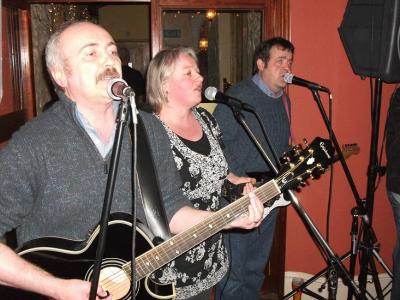
One day you are sitting in the audience, the next day you're performing. That's Fringe. Just the night before I was, unbeknownst to me, sitting next to most of Nine Feet North at Club Acoustic. What a small world it is. Now, I'm of an age whereby I can remember buying CSN's Suite: Judy Blue Eyes as a 7" single (and I still have it). So of course I had to and see this show. Nine Feet North are a local band led by Paul Cromford and ably assisted by Emma Shanks, Carole Mordaunt-Todd and Rob Harrison.
What Nine Feet North do is to give the audience a taste of what it was like back in the summer of '69 via a couple of songs from '67 as a root-map. Whilst 21st century Buxton will never pass as late 60's California, the band do a fair job. The roots of CSN were varied and we were given a little background to help us on the journey. The songs from the album were presented as they are on the album, even down to being introduced as Side 1 and 2. The audience clearly loved what they were hearing and a solid round of applause greeted the end of each song and the band clearly loved what they were doing. I was musing during the show whether they might be back next year with addition of Mr Young and 'Déjà vu', but they beat me to it as they ended with Carry On from that very album!
Nine Feet North are not a tribute band, but rather a group friends who clearly hold the album in deep affection. It is hard not to imagine them in their younger days, locked away in their bedrooms playing the album repeatedly. They are back at Underground Venues on the 11th and 20th, and if you like late 60's music, this is a place for you.
Ian Heath
p.s.The photograph shown was taken in January, before third singer Emma and current guitarist Rob had joined the band. The guitarist pictured far right is actually Will Hawthorne, who left the band in April.
THE VOICE OF THE GUITAR - Edward Billingham
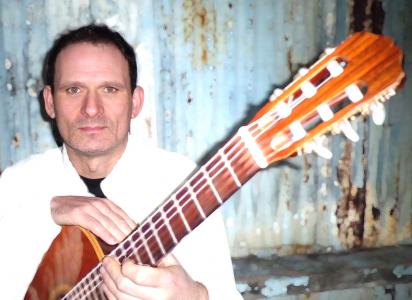
I'm not entirely sure what I was expecting from The Voice of the Guitar, an evening of music performed by Edward Billingham. The Burbage Institute is your typical village hall - quiet and unassuming. Edward wandered onstage with no pomp or ceremony, and his short introduction was that there would be no string slapping or shouting, just an evening of easy going music. Then he started to play and it became quite clear that this was no ordinary concert. It is evident that Edward enjoys what he does, his passion and skill is easy to detect when he plays. He had chosen a selection of Latin American, Baroque and Folk pieces, which took the listener through a series of moods.
We heard the sultry yet vibrant pieces from Albeniz, the beautifully melodic and light work of Mauro Giuliani, the lively folk music of Antonio Lauro. I particularly enjoyed hearing pieces originally written by Bach for the harpsichord, I had no idea that it would sound so complex and beautiful on guitar. Throughout the evening I began to understand why I was sitting in the Institute for this performance.
The acoustics suit the guitar very well, and many times it felt lovely to close my eyes and listen to the warm Latin American music wrap around the hall - all I needed to complete the evening was a glass of red and some South American sunshine! I was so absorbed in the last piece for the evening (Seis Por Derecho by Lauro) that when the ending came it felt too soon, I could happily have listened to more. I hope that we shall see Edward performing in Buxton again soon, and when he does I'm going to make sure I have another front row seat - perhaps this time with that red...
Emma Thompson
TIDESWELL MALE VOICE CHOIR AND FRIENDS - Tideswell Male Voice Choir
Excellent, Excellent, Excellent - but you all probably knew that already, right?
I have just spent a thoroughly enjoyable 2 hours in the company of this very tuneful group of men and the delightful children from Harpur Hill primary school brass band and choir. All in the wonderful setting of St John's church.
The set started with 'You'll never walk alone' from Carousel which I have always felt was like a prayer and brings a lump to my throat. Followed by 'Nothing like a Dame' from South Pacific which evokes memories of Morecombe and Wise and always makes me smile. The audience was encouraged to join in the whole of the programme by MC and musical director Dennis Kay who did an excellent job of keeping it all together and had clearly done a fine job rehearsing and rehearsing the performers - nothing sounds that good without hours and hours of practice!
We were treated to an eclectic mix of new and standard songs all beautifully arranged by Christopher Ellis who accompanies the choir wonderfully.
After the interval we were entertained by the Harpur Hill Primary school Brass Band, made up by year 5 and 6 children who played a selection of tunes, brilliantly! I once had a go at blowing a trumpet and it is very difficult to get anything other than a strangled blast from it - well done, especially as some of the children were playing instruments almost as big as themselves!
Following another set from TMVC the choir from Harpur Hill primary school entertained us again with a selection of songs including 'The Ugly Duckling' and topped off with 'Consider yourself one of us' from their production of Oliver - due to be performed again next week.
The final set was a medley from Les Miserables, including a beautiful solo rendition of 'Bring him home' from Mr Kay himself, and the rousing battle cry 'Do you hear the people sing?' from the ensemble to finish.
This group of talented men raise thousands of pounds for charity by making beautiful music with their voices, they deserve our support but just as importantly, it is a terrific way to spend a couple of hours. Congratulations to all concerned. Loved the choreography!!! Thank you.
Linda McAlinden
YOU SAY YOU WANT A REVOLUTION - Scott Allsop

Right at the start of Scott Allsop's show he confronts the elephant in the room; the recent military overthrow of Mohamed Morsi. "Two weeks ago" he tells us with a chuckle, "I thought this show was finished." With the prescience of a modern day troubadour, he has written a new song which reflects recent events.
Scott Allsop is a British history teacher who found himself, with his wife, in Egypt, because they wanted an adventure. Little did they know that they would soon bear witness to the most exciting time, in terms of political upheaval, that that country has known. In short, his story tells us what it is like to be a westerner caught up in the middle of an eastern revolution.
Allsop is an excellent story teller, an accomplished musician, and a competent singer. This last fact matters little, however, since what he lacks in octaves, he more than makes up for in sincerity and passion.
Rather than use his songs to describe events, he concentrates on the feelings of the protestors in Tahrir Square - anger, hope, a yearning for change. The events of 2011 came as a surprise not only to him, it would seem, but also to many Egyptians. Because the big protest was due to happen on a bank holiday, it was felt people would favour a lie-in.
It was this sort of detail that gave us a real insight into the impact of a revolution on the people caught up in it. Although he offers no political analysis of events, he does present them in a clear and concise way. Think of From Our Own Correspondent, but with songs. I particularly enjoyed the notion that the recent military coup happened because, as members of a young democracy, Egyptians have not yet become cynical about their elected leaders; they expect them to keep their promises. Hence, after a very short space of time, Morsi had to go.
The overthrow of Hosni Mubarak was obviously a major turning point in the life of all Egyptians. Allsop's major turning point came with the birth of his daughter. He contributes a couple of songs on the subject of the tiny revolution that happens within many families, when two become three. He also uses song writing as a way of recording the minutiae of everyday Egyptian life, just in case things change beyond recognition, his daughter will still know of the world she was born into.
With clever use of pedals and loops, Allsop's guitar grows in stature and its sound fills the underground bar, echoing hope and freedom. His own material is intercut with existing songs, sadly veering somewhat towards pomp rock (Muse, Coldplay, U2) which only serve to highlight the strength of his own song writing. By far the most powerful song of the evening though, comes from the pen of an Egyptian friend. Stuck in Britain during the 2011 uprising, it tells of her frustration and desire to get back to her homeland and participate herself. These three minutes are worth the price of admission alone.
Malcolm Lomax